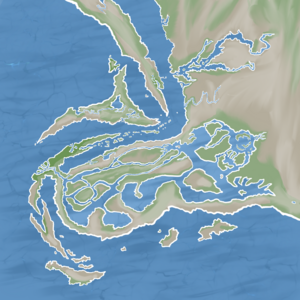El Fwonk Casanosia
El Fwonk Casanosia (Arodjun: Ezle Fwonk K'sleinozlja) refers to the state, or collection of states, that occupy the territory of the Fwonnel Peninsula, as considered by Arodjun-speaking pups, since the region's independence from the Permechikan Empire in 1845 AR.
Since its initial independence, El Fwonk Casanosia has existed in multiple forms and been formally or informally dissolved during times of crisis or foreign occupation several times. See Timeline of the Fwonnel Peninsula for a simple visualized breakdown. The majority of the time after 1845, however, the nation has been at least nominally unified by the Charter of El Fwonk Casanosia, a foundational legal document.

The exact borders of what constitutes “El Fwonk Casanosia” have also changed may times, especially its eastern bounds. The Permechikan Desert makes for a difficult boundary to define, despite several attempts to do so, including walls and military garrisons.
Ecology and Geography
(see Fwonnel Peninsula for more details)
The majority of El Fwonk Casanosia is located on the Fwonnel Peninsula, which has very rugged terrain, ranging from hilly to sharply mountainous. The ecosystem is overall subtropical, with some areas being wetland, others being monsoonal desert, and others being alpine forest.
The ecology of El Fwonk Casanosia is entirely dependent on the water that comes from the Great Geyser Lake, an enormous series of springs located along the Irkun Fault that create the Prins River and its tributaries.
A series of large lakes and streams exist throughout the peninsula, most of which lead to the Death Canyon River and Death Canyon Delta at the northwest corner of the Froof Straits. Most of the lakes and rivers were not natural - they were dammed up, dug, and dredged by countless generations of Pups going back thousands of years. The most recent significant change to the map of El Fwonk Casanosia was the 1836 AR Flattening of Mount Supuksis by the Permechikan Empire, linking together the islands of Fwonn and Fishtail.
History
(see Timeline of the Fwonnel Peninsula for a breakdown of the history of the peninsula beyond simply the country of El Fwonk Casanosia)
The origins of the nation of El Fwonk Casanosia can be largely traced to the events leading up to the War of the Pearl and subsequent conquest by the Permechikan Empire.
War of the Pearl and the Consolidation of Modern Cultural Identities (early 1500s - 1565)
(write War of the Pearl section)
Span Dynasty Period (1565-1699)
The Permechikan Conquest was largely complete by 1565. The ruling Span Dynasty at the time had no interest in affecting the culture of the subjugated peoples. The Span ruling class largely saw themselves as a restoration of the Prins Empire from two centuries before, and as such they promoted Prins-style economic practices, gave special social benefits to subjects of Prins heritage, and preserved the use of Base-10 numerals in practical life. Other than this, the citizens of the new Province of Fwunúrucun were allowed to speak Early Modern Arodjun, Early Modern Irkun, Loutzuman, Frufi, or Kleonid without issue. Their cultures were not heavily impacted as long as their practices didn’t question or interfere with the authority of the Thúr of Fwunúrucun (anglicized as “Viceroy”, or described using the Imperial Prins term *baven*).
The biggest changes to daily life were economic activities, including the mass exploitation and export of natural resources to the rest of the empire. The old Prins currency, the Filinren, or “Prins Palm,” was replaced with the Búquful, the “Prins Imperial Ball.” Ports were secured with new military fortresses and heavily expanded for the increased exporting to the rest of the empire.
N7ll7th Dynasty and Growing Unrest (1699-1820)
The Span Dynasty came to an end after Permechikan nationalists overthrew the Span government in Pemex and drew the support of many of the northern military legions. Nú7ll7th became the new emperor in 1699 and Fwunúrucun was placed under the leadership of Thúr Kultú8llus18. The leadership style changed significantly, and the daily life of the citizens of Fwunúrucun was placed under much heavier scrutiny.
A new official brand of the Bez religion was established that stripped religious authority from local leaders or the successors to the Ark Dynasty of Fwonnel Bezubuv, shifting the right to terraform to the Thúr. New Brueaucratic Government “Capacity Tests” were introduced, which made proficiency in the Permechikan language a requirement to reach higher levels in government-controlled businesses and offices. Licenses were required for native-owned vessels to sail in and out of Imperial-controlled ports, which required heavy fees to maintain. New taxes were also implemented on goods purchased in the Fwonnel Peninsula, even if they were purchased by local businesses for sale. All of this, and many other acts of restriction on the public, led to growing resistance, both public and private.
By the late 1700s, pre-Permechikan nationalism became popular amongst the cultural groups of the Peninsula. Arojaunzans became the first to actively rebel. Pejoratively named “Casanosians” (from Arodjun K’sleinozlja “land of the people with foreign ideas”), various bands refused to acknowledge Permechikan authority. Soon enough, they were engaged in gun and melee battles with Permechikan soldiers and police.
Rebellious fervor permeated the Peninsula, though most anti-government action was in secret, or done via committing tax fraud, forgery, or other acts of economic subversion. This is the context in which two of the founding Fathers of El Fwonk Casanosia were raised, Cato and Vara. Both were born in the city of Dedun, which, while not geographically a part of the Fwonnel Peninsula or even historically a part of any of the Peninsular societies, was a hotbed for underground revolutionary activities.
The El Fwonk Revolution (1836-1847)
(see El Fwonk Revolution for more information)
